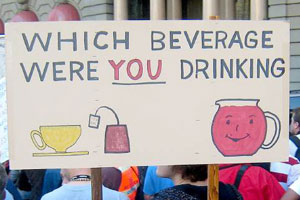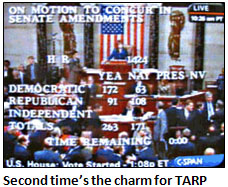
<a href="http://www.zombietime.com/zomblog/?p=1134">zomblog</a>
What was I doing two years ago? Well, according to my blog, on September 29, 2008 I was “consumed with a debilitating combination of fury and despair.” Why? Because following two weeks of unprecedented financial meltdown, the House had just rejected Henry Paulson’s bank bailout bill, the Troubled Asset Relief Program.
Does my reaction seem melodramatic? I suppose it does today, but it’s easy to forget just how fragile the financial system seemed back then. Bear Stearns had failed. Lehman Brothers had failed. Merrill Lynch had been sold off and AIG had been rescued at the 11th hour. The commercial paper market had locked up. Interest rate spreads had spiked to unprecedented levels, there were runs on money market funds, and in many parts of the economy credit had dried up almost completely. Some of the biggest banks in the world seemed on the brink of failure and others just plain failed. On Sunday the 28th, Belgium, the Netherlands and Luxembourg had stepped in to rescue Fortis, Germany had been forced to bail out Hypo Real Estate, and the British Treasury had seized Bradford & Bingley and sold it off. In the United States, the Fed was tapped out, panic was in the air, and TARP was pretty much the only option left for rescuing the banking system. But what happened? Even though it was proposed by a Republican president, supported by a Republican treasury secretary and a Republican Fed chairman, and backed by the Republican leadership, two-thirds of House Republicans voted against it.
After the House voted down TARP the Dow Jones plunged 400 points in ten minutes. By the end of the day $1.2 trillion had been lost on U.S. exchanges and regulators were rushing to try to sell off Wachovia, the biggest  bank yet to fail. That finally got the attention of GOP backbenchers, and a few days later a revised TARP bill (stuffed with some extra goodies as bribes) was passed. Markets relaxed and everyone breathed a little easier.
bank yet to fail. That finally got the attention of GOP backbenchers, and a few days later a revised TARP bill (stuffed with some extra goodies as bribes) was passed. Markets relaxed and everyone breathed a little easier.
But even though TARP eventually passed, September 29th was still the key moment, one that I’ll always think of as the birth date of the Tea Party movement. It didn’t get its name until CNBC’s Rick Santelli famously ranted on air about Obama’s housing rescue plan a few months later, but the spirit had been there ever since TARP was initially defeated. To this day, tea partiers remain convinced that it was both unnecessary and a vast black hole for taxpayer money. Neither is true, but the tea party view is now so pervasive that, as Ben Smith reports, politicians of both parties consider TARP the new third rail of American politics:
The Troubled Asset Relief Program is widely viewed as the original sin of the Obama administration — though it was put together under President George W. Bush and succeeded far beyond expectations. It’s widely seen as the tipping point for disgust with elites and insiders of all kinds — though it could also be seen as those insiders’ finest moment, a successful attempt to at least partially fix their own mistakes.
….And the rank and file in both parties have channeled that anger into an assault on members of Congress who voted for the measure. Politicians have spent about $80 million on ads this cycle mentioning bailouts — every penny of it negative — with Democrats spending the bulk of that sum, $53 million, according to an analysis by the Campaign Media Analysis Group’s Evan Tracey.
….A study this summer by former Fed Vice Chairman Alan Blinder and Moody’s chief economist Mark Zandi […] projected that without federal action — TARP and the stimulus — America’s gross domestic product would have fallen more than 7 percent in 2009 and almost 4 percent in 2010, compared with the actual combined decline of about 4 percent.
“It would not be surprising if the underemployment rate approached one-fourth of the labor force,” they wrote of their scenario. “With outright deflation in prices and wages in 2009-11, this dark scenario constitutes a 1930s-like depression.
And the cost of TARP? CBO estimates the government will make a profit of $7 billion from the bank bailouts (though it may still lose money on GM and Chrysler, which were also rescued with TARP funds) and it now looks like AIG will pay back all its bailout money too. Bottom line: the ongoing recession caused by Wall Street’s reckless behavior has cost us a bundle. But TARP itself? Its net direct cost is zero, and when you include the fact that it almost certainly saved the banking system and softened the recession, it may boast the biggest bang for the buck of any bill ever passed by Congress. Karl Smith, a professor of public economics at the University of North Carolina, writes:
If no one else will defend TARP, I will defend it. I will defend it through any medium, at anytime, under any circumstances. I will be the lone voice in a town hall full of Ron Paul supporters. I will say it at a Code Pink Regional Conference. I will not let this go.
There are few moments when I have shed a tear over policy. Despite initial missteps what I saw was lawmakers coming together in the face of overwhelming public opposition to protect the future of our society. It made me more confident in our government than any other single event I have ever experienced.
I can’t say that I feel the same way. Yes, TARP eventually passed, and yes, I’ll defend it anytime too. But it also represents the modern rebirth of know-nothingism represented by the Tea Party movement. I don’t have a problem with the tea partiers’ anger — hell, I share it — but instead of channeling it into a demand for genuinely game-changing reform of Wall Street, conservative demagogues and business interests managed to channel it into mindless rage at one of the very things that saved us from Wall Street’s folly. The tea parties will eventually pass into the dustbin of history, I suppose, but in the meantime TARP’s fortunes certainly haven’t made me more confident that our government can do the things it has to do. Instead, TARP turned out to represent the outer limit of what our government can do, and that was just the bare minimum to avoid catastrophe. We deserve better than that.
















